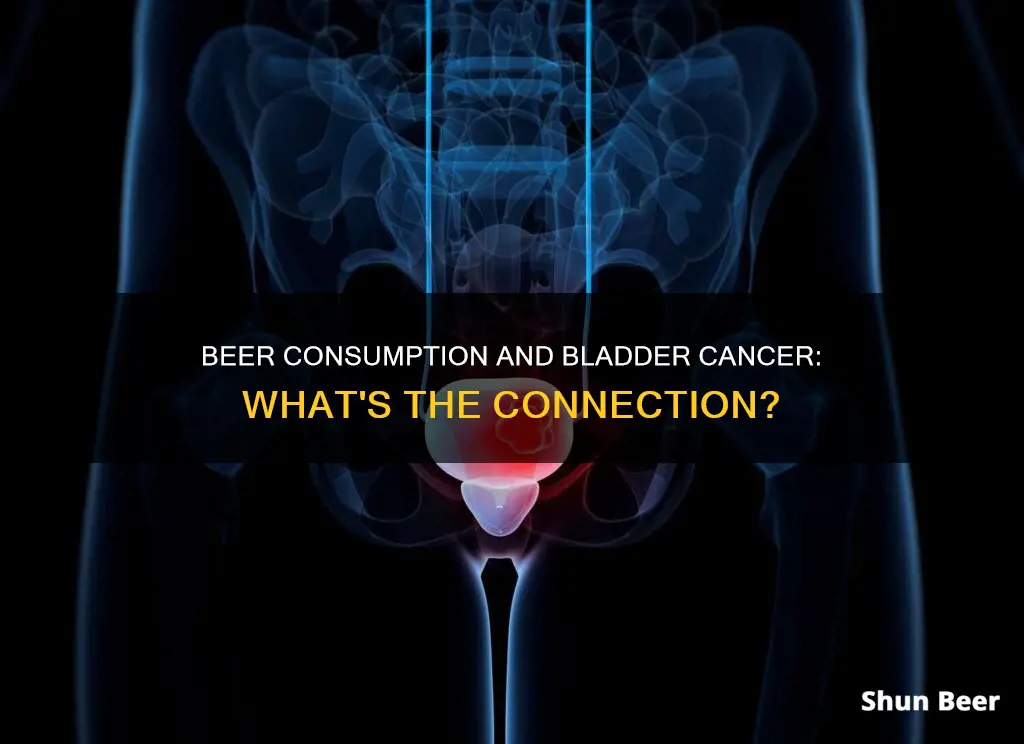
Drinking alcohol does not directly increase the risk of developing bladder cancer. However, high alcohol consumption, especially when combined with smoking, may elevate this risk in men.
| Characteristics | Values |
|---|---|
| Alcohol consumption and bladder cancer risk | No distinct link between alcohol intake and bladder cancer risk has been established. |
| Alcohol consumption and urothelial cell carcinoma (UCC) risk | Alcohol does not directly affect an individual's risk of developing UCC. However, high alcohol intake and smoking may raise this risk among men. |
| UCC risk factors | Smoking and arsenic in drinking water. |
What You'll Learn

Drinking beer and bladder cancer risk in men
While bladder cancer is more common in men than in women, the link between alcohol consumption and bladder cancer is not clear. However, some studies suggest that high alcohol intake and smoking may increase the risk of bladder cancer among men.
Alcohol consumption and bladder cancer risk
Several studies have investigated the association between alcohol consumption and bladder cancer risk, but the results are inconsistent. While some studies suggest a slightly elevated risk of bladder cancer for men who drink alcohol compared to those who abstain, others find no significant association. One study found that the risk of bladder cancer for men who drank alcohol was 1.43 times higher than for non-drinkers, but this result was not statistically significant. Another study of 476,160 individuals found no significant difference in bladder cancer risk between those who drank alcohol and those who did not.
Beer consumption and bladder cancer risk
The link between beer consumption and bladder cancer risk is also unclear. One study found that the risk of bladder cancer for men who drank beer was slightly higher than for non-drinkers, but this result was not statistically significant. Another study found no significant association between baseline consumption of beer and bladder cancer risk. However, it is important to note that the risk of bladder cancer may be influenced by the amount and type of alcohol consumed, as well as other factors such as smoking status.
Smoking and bladder cancer risk
Smoking is the biggest preventable cause of bladder cancer, with around half of all bladder cancers being attributed to smoking. The risk of bladder cancer is up to four times higher for smokers than for non-smokers, and the risk increases with the number of cigarettes smoked and the duration of smoking.
Combined effects of alcohol and smoking
The combined effects of alcohol consumption and smoking on bladder cancer risk have been studied, and the results suggest a possible synergistic effect. One study found that male smokers who drank more than 96 grams of alcohol per day had the highest risk of bladder cancer, with a hazard ratio of 1.82 compared to those who drank less than 6 grams per day. Another study found that high baseline intakes of alcohol (>96 grams/day) increased the risk of bladder cancer only in men and smokers. These results suggest that alcohol and smoking may have a synergistic effect on bladder cancer risk.
While the link between alcohol consumption and bladder cancer risk is unclear, some studies suggest a possible small increased risk for men who drink alcohol, especially when combined with smoking. However, more research is needed to confirm these findings and to understand the underlying mechanisms.
Troubleshooting a Beer Siphon: What You Need to Know
You may want to see also

Drinking beer and bladder cancer risk in smokers
Smoking tobacco is the biggest cause of preventable bladder cancer. Those who smoke are up to four times more likely to develop bladder cancer than those who do not. The risk is especially high for those who start smoking at a young age and continue to smoke for a long time.
While there is no distinct link between alcohol intake and bladder cancer, high alcohol intake and smoking may increase the risk of bladder cancer among men. A study of 476,160 individuals in the European Prospective Investigation into Cancer and Nutrition (EPIC) cohort found that male smokers who drank more than 96 grams of alcohol per day were at the greatest risk of developing urothelial cell carcinoma (UCC), a type of bladder cancer.
Another study of 120,852 subjects in the Netherlands found that the risk of bladder cancer for men increased slightly with the quantity of alcohol consumed, irrespective of the type of alcoholic beverage. However, no statistically significant dose-response trends were identified, and there was no association between alcohol consumption and bladder cancer risk for women.
Overall, while smoking is a well-established risk factor for bladder cancer, the association between alcohol consumption and bladder cancer risk is less clear. More research is needed to fully understand the relationship between alcohol intake, smoking, and bladder cancer risk.
Birth Control and Beer: Is It Safe to Drink?
You may want to see also

Drinking beer and aggressive bladder cancer risk
The association between alcohol consumption and bladder cancer risk has been the subject of several epidemiological studies. While some studies suggest a possible link between high alcohol intake and increased bladder cancer risk, particularly in men and smokers, others have found no significant association. It is important to note that the evidence is not conclusive, and more research is needed to establish a clear understanding of the relationship.
Alcohol consumption and bladder cancer risk
One study analysed data from 476,160 individuals in the European Prospective Investigation into Cancer and Nutrition (EPIC) cohort to determine any link between alcohol intake and urothelial cell carcinoma (UCC) risk. The study found no significant difference in UCC risk between baseline alcohol intake and gender or smoking status. However, men drinking more than 96 grams of alcohol per day had a higher risk compared to those drinking less than 6 grams per day, with a hazard ratio (HR) of 1.57. Male smokers who consumed more than 96 grams of alcohol per day had the highest risk, with an HR of 1.82.
Another study, the Netherlands Cohort Study, investigated the association between alcohol consumption and bladder cancer risk in 120,852 subjects aged 55-69 years. The results suggested a slightly elevated risk of bladder cancer for men who consumed alcohol compared to abstainers, with an incidence rate ratio of 1.43. However, the association was not statistically significant, and the study concluded that alcohol consumption does not have an important influence on bladder cancer risk.
Alcohol consumption, smoking, and bladder cancer risk
It is important to consider the potential synergistic effects of alcohol consumption and smoking on bladder cancer risk. Tobacco smoking is the leading cause of bladder cancer, and it is positively correlated with alcohol consumption. Smoking can act as a powerful confounder in studies investigating the link between alcohol and bladder cancer. In one meta-analysis, the excess risk of bladder cancer associated with high alcohol consumption disappeared when smoking-unadjusted estimates were removed.
Beer consumption and bladder cancer risk
When examining the impact of different types of alcoholic beverages on bladder cancer risk, one meta-analysis reported a negative association between beer and bladder cancer, while another study found no significant association between baseline beer consumption and UCC risk. However, it is important to note that these findings may be influenced by residual confounding factors, such as smoking status.
While some studies suggest a possible link between high alcohol intake and increased bladder cancer risk, particularly in men and smokers, the evidence is not conclusive. More research is needed to establish a clear understanding of the relationship between alcohol consumption, including beer drinking, and bladder cancer risk. Residual confounding by smoking may explain the association between high alcohol intake and increased bladder cancer risk observed in some studies.
The Magic of Beer Batter: Science Behind the Fizz
You may want to see also

Drinking beer and bladder cancer risk by age
Drinking alcohol is associated with an increased risk of developing several types of cancer. According to the National Institute on Alcohol Abuse and Alcoholism, a standard alcoholic drink in the United States contains 14 grams of pure alcohol. This amount of alcohol is typically found in 8-10 ounces of malt liquor or 1.5 ounces of distilled spirits.
While there is no clear link between alcohol consumption and bladder cancer risk according to quantity and type of alcohol consumed, studies have shown that alcohol consumption is a risk factor for bladder cancer in men. One study found that the age-adjusted risk for men who drank alcohol was 1.43 times higher than that of non-drinkers, and this risk increased with the amount of alcohol consumed. Another study found that men who drank 15-30 grams of alcohol per day from beer had a slightly higher risk of bladder cancer, with an incidence rate ratio of 1.70. However, higher intakes of beer were not associated with an increased risk.
In contrast, there does not appear to be a significant association between alcohol consumption and bladder cancer risk in women. One study found no association between alcohol consumption and bladder cancer risk for women, while another study suggested that light female drinkers might have a lower risk of bladder cancer.
It is important to note that the relationship between alcohol consumption and bladder cancer risk may be influenced by other factors such as smoking status, amount, and duration, as well as genetic factors.
Enjoying Beer at Football Games: What's the Deal?
You may want to see also

Drinking beer and bladder cancer risk by occupation
While drinking beer is not directly linked to bladder cancer, excessive alcohol consumption can increase the risk of developing bladder cancer. According to the National Institute on Alcohol Abuse and Alcoholism, a standard alcoholic drink in the US contains 14 grams of pure alcohol, which is typically found in 12 ounces of regular beer. Heavy drinking is defined as consuming more than 4 drinks in a day or 14 drinks per week for men, and more than 3 drinks in a day or 7 drinks per week for women.
Excessive alcohol consumption has been linked to an increased risk of developing several types of cancer, including head and neck cancer, esophageal cancer, liver cancer, breast cancer, and colorectal cancer. However, the link between alcohol consumption and bladder cancer is less clear and requires further investigation.
Occupational risk factors for bladder cancer have been studied, and certain occupations have been associated with an elevated risk. These include precision metalworkers, mechanics and repairers, automobile mechanics, plumbers, and machine operators. However, the specific association between drinking beer and bladder cancer risk by occupation is not explicitly mentioned in the sources.
Pregnancy and Alcohol-Free Beer: Is It Safe?
You may want to see also
Frequently asked questions
There is no distinct link between bladder cancer and alcohol consumption. However, high alcohol intake and smoking may increase the risk of urothelial cell carcinoma (UCC) in men.
UCC is a type of bladder cancer that is directly linked to smoking and the presence of arsenic in drinking water.
Aside from smoking tobacco, risk factors for bladder cancer include previous chemotherapy or radiation therapy, chronic bladder irritation, bladder birth defects, and a personal history of cancer in the urinary tract.







